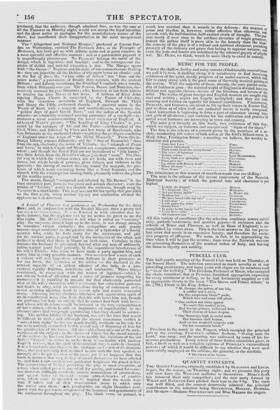A Legend qf Florence was performed on Wednesday . for the third
thee; and, in conjunction with the Nuptial Masque, drew a pretty full but not a cromko hon,... It N• listened to with attention that be- a'poke interest, but the applause was by no means so great as' on the first night. Mr. Husar's drama is not what is called an " exciting" play : the suspense, though kept up to the close. is not strong enough to Stimulate vulgar curiosity : the sympathies are only gently moved—kept somewhat in the passive state of a bystander at a family quarrel, who, while he feels sorry for the occurrence, and pity for the weaker party, is perplexed by the intricacies of the affair, and inclined to think that there is blame on both sides. Certainly in this instance the husband is provoked, beyond what any man of ordinarily- infirm temper could bear patiently, by the impertinent interference of his wife's friends; who seem to have made a party against him, and annoy him in every possible manner. One wonders how amen of such a violent will and imperious nature forbears in their presence: as for the lover, the intrusion of his advice on the husband in the avowed capacity of an ardent admirer of the lady, is a pro- ceeding equally fruitless, indelicate, and intolerable. There things considered, in connexion with the nature of Agolanti—which is not wholly bereft of afibetion and a sense of' justness tempering his sternness—it is puzzling to account for that obstinately perverted view of his wife's character, whiell confounds her submissive patience and desire to obey, with an ostentatious display of endurance and a secret aversion showing itself in covert spite and scarce concealed scorn. Allowing for the obstinate blindness and aggravating spirit of an ill-conditioned man, who feels that his with loves him not, though she performs her duty so strie:ly that he cannot find fault with her,— and whole will thenenre would be irritated at the very exemplariness of her conduct,—there is still en impression of improbability in the eircumsnmees that sets people questioning V: lien they should be sorrow- ing. The sudden killing of the husband, toe, cut,: the knot that would be difficuit to untie ; and although the elmost matnimous verdict is " served him right," he hes too much worldly rectitude on his side for one to be entirely reconellgt to this casual way of disposing of him for the gratification of the lovers. All tio,:, objections arise out of the awk- warduess of the sul jest ; in the choice of widish lies the grand mistake of the author : he has Lech Nreocl so to healify the incidents of the old Italian " legeed." in order to make them reseneileable with modern Engli-11 iint107:S, that the spirit et' the ov lei nal s,ors is entirely changed. It is a remarkable excellence in the dialogue, end .t test of its dramatic force, that you generally feel inclined to side with the last speaker, so strongly does he lilt Ilk view of the ease vet it so happens that this tends to increase that eery tov.aii ,Ihetot loess we have alluded to; and thus a rare merit ia one particular heightens the grand defect. The earnest tone of feeling 1.ervading the play is most acceptable, at a time when stilted prose is passed of for poetry, and sound for sense : one therefore willingly overlooks certain mannerisms of phraseology, and quaiiit turns of tle.uelit-- vague ultra-delicacies of expres- sion, where more is intended to be implied than the words war- rant if' taken out of that conventional sense in which only the writer uses them : such peculiarities arc slight blemishes com- pared with the passionate eloquence of the language and genuineness of the seminient throughout the play. The blank verse, on perusal, is much less metrical than it sounds in the delivery : the mixture of prose and rhythm is, however, rather effective than otherwise, and accords with the half-familiar, half-exalted strain of thought. The pas. sion rarely if ever rises to the sublime elevation of tragic. grandeur; indeed the pathos itself is more akin to the homely than the ideal; the comedy of the play is of a refined and spiritual character, partaking strongly of the delicacy and grace that belong to superior natures; and even the jests and banter are subtilized by the ethereal gayety of playful wit. Mr. Hun'r, we think, would be more likely to excel in comedy,


























 Previous page
Previous page